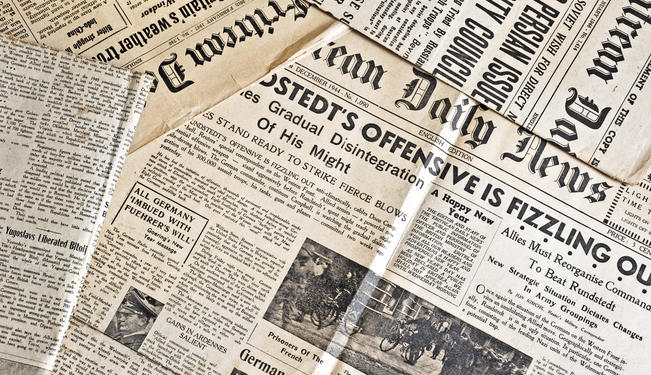Western media must avoid the trap of self-serving propaganda.
We are all aware of the power of reputation. How we are described by others, matters. It influences people’s perception of us. We can fast develop a bad — or a good — name. The same applies on the macro-level. Governments can get a very different reputation depending on the way in which they are described.
This may sound all rather obvious, but reputation formation is not always as straightforward as we may imagine. The assumed equation we tend to carry around in our heads goes something like this:
Government acts badly =
Government is described in negative terms =
Government gets a bad reputation
However, in the world of international politics and its media portrayal, more subtle semantics are at work. The people who write the news stories we read are generally educated in, and ideologically committed to, the western democracies.
This state of affairs could be expected to incline them to describe governments of a western democratic nature in a positive light. So far, so good, you may say. If a government is democratic in nature, it should develop a good reputation. If it is not a democracy, it should get a bad name accordingly.
“Regime” vs “Administration”
And so it is borne out in our media diet. Take two different words, both of which describe a system or method of government: regime and administration.
The word “regime” is from the French régime — derived from the Latin regimen — meaning, to rule. It is a noun described by the Oxford English Dictionary as “a government, especially an authoritarian one.” The Cambridge English Dictionary notes that the word, meaning “a particular government or a system or method of government,” is used “mainly disapproving[ly].”
What is clear is that this word, though rooted in the objective matter of ruling, nonetheless holds negative connotations when applied to the rule of a governmental system over a population.
Meanwhile, the word “administration” from the Latin administratio, means the process of running something. In the context of government, the word is described by the Oxford English Dictionary as a count noun, denoting “the government in power.” The Cambridge English Dictionary describes the word as merely “the arrangements and tasks needed to control the operation of a plan or organization” — so banal, one could argue, as to be beyond ideology entirely.
What emerges from such analysis is that to describe a governing authority as a “regime” connotes something quite different to describing it as an “administration.” While the first tends to connote a government with a tendency towards authoritarian or totalitarian rule, the latter connotes a democratic, and therefore legitimate, ruling political actor.
For example, the description the “US administration” sounds entirely plausible to the western media consumer, as does the description the “Nazi regime.” The opposite, the “US regime” and the “Nazi administration,” sounds distinctly subversive.
This pattern can be seen repeated many times: the “Ba’athist regime,” not the “Ba’athist administration;” the “Conservative administration,” not the “Conservative regime;” the “Qaddafi regime,” not the “Qaddafi administration.” All descriptions refer to the governing power in a country, but all offer a tacit value judgment about the legitimacy of that power.
In terms of dictatorships such as those in Ba’athist Syria or Qaddafi’s Libya, it can be argued that such a value judgment is entirely justified in the presentation of the facts to the western media consumer. It places a “regime” without the moral authority of a democratic mandate in a fair context as opposed to a democratic “administration.”
The Grey Areas
Such a linguistic moral gauge is reasonably easy to find a consensus on when we are dealing in terms of a “Nazi regime” or a “US administration.” It is assumed that only the most radical would question such linguistic value judgments. The trouble starts when we enter the murkier waters where ideologies and cultures meet.
Take, for example, the Justice and Development Party (AKP) government of Turkey, led by Prime Minister Recep Tayyip Erdogan. The AKP is a party that has won three general elections that were regarded as free and fair, not only within Turkey, but also by the international community. It would not be controversial to regard it as the democratically elected government of Turkey.
However, this government does not always receive the designation of “administration” in the international media. It has been termed “the Turkish regime” in the Jerusalem Post and “Turkey’s Islamist regime” in the US weekly, the Jewish Press. This is perhaps not surprising when we consider the mildly Islamist nature of the AKP, and the tense relations between its leadership and the Israeli government — a traditional Turkish ally.
Yet, the AKP government of Turkey has received the title of “regime” more widely in the western press. On June 9, the Huffington Post termed the Turkish government as “the Erdogan regime,” the Independent on June 2 described “anti-regime protests” in Istanbul, and the Wall Street Journal ran a June 7 story entitled “Pro-Regime Turks Answer Protestors.” Despite the democratically elected nature of the government, the “regime” tag is one that triggers an instant moral reaction in most western media consumers.
Protests — sometimes violent — against western democratic governments are never portrayed in the mainstream western media as protests against “regimes.” Such protests often target what they perceive as government corruption, capitalist greed and heavy-handed policing, just as the protestors in Turkey have, and yet western democratic “administrations” do not become “regimes.”
The Islam vs Democracy Issue
What appears to be at work is not merely a straightforward moral judgment, embedded in linguistics, based upon democratic principles, but a wider objective based upon rather more subjective western prejudices. Dictatorships are run by “regimes” and democracies are run by “administrations.” Yet, too often for coincidence, democracies run by Islamist “administrations” are called “regimes.”
On February 6, the Independent ran a story entitled “Uprising in Tunisia as Regime Critic is Murdered.” The “regime” referred to is the ruling coalition that was formed as a result of the first free and fair elections in Tunisia since the fall of the Ben Ali dictatorship. It is led by the Islamist Ennahda Party, in coalition with the secular Congress for the Republic, and the centre-left Ettakatol.
Although the implication of the headline is that the “regime” murdered a critic, the slain man — Chokri Belaid of the left-wing Democratic Patriots’ Movement — was not killed by Ennahda or the ruling coalition, but by a lone gunman likely motivated by an extreme Islamist ideology. A democratically elected government would have little to gain from murdering its critics, and much to lose.
On April 21, the Guardian wrote of the “Muslim Brotherhood regime” in Egypt, in an article that also spoke of “the old Mubarak regime.” This places the now ousted Egyptian government on par with the Mubarak government in terms of the moral implication of the language used. Similarly, the Telegraph spoke of “a regime” in reference to the Muslim Brotherhood-led government of Egypt in an article on December 1, 2012, and the Financial Times referred to Egypt’s military pulling the plug on “Morsi’s regime” in a story on July 3.
Run as a semi-presidential system, Egypt witnessed the only free and fair presidential election in the nation’s history in 2012, with the Muslim Brotherhood’s Mohammed Morsi winning with a 51.73% share of the vote in the run-off. Parliamentary elections saw the Muslim Brotherhood’s Freedom and Justice Party win most seats, followed by the Salafist Al-Nour Party.
To apply the same linguistic description to the democratically elected Islamist-led governments of Tunisia and Egypt, as is applied to the dictatorships that preceded them, is to deal — whether consciously or not — in dangerous value judgments about the legitimacy of democratically elected Islamist leaders.
The moral judgment embedded in such language has a wider context within western intellectual thought. The theory that Islam and democracy are essentially incompatible has deep roots. However, the theory has been developed in recent decades by scholars such as Ernest Gellner (Conditions of Liberty: Civil Society and its Rivals), Bernard Lewis (What Went Wrong? Western Impact and Middle Eastern Response), Elie Kedourie (Democracy and Arab Political Culture), and Samuel Huntington (The Clash of Civilizations and the Remaking of World Order).
The theory has been a central intellectual bulwark of western foreign policy that chose to support the maintenance of autocratic dictatorships in the Middle East and North Africa. From such theory, the political argument follows that it is better to have an autocratic “regime” friendly to Western interests than an Islamic “administration” that would — the theory runs — be ideologically anti-democratic.
Judgments vs Subliminal Judgments
The question of whether moral judgments should be embedded in the language that the media uses is one for debate in itself. Perhaps all governments should be classed as “governments,” without the moral value of “regimes” or “administrations” laid upon them, allowing the reader to analyse the politicians’ actions for themselves?
This is not to argue that the media should not analyze and express the differences between an autocratic and a democratic government. To pretend that they are somehow equal would be absurd and ultimately self-censoring. The danger is when the media makes oblique, moral judgments in the language it uses — whether consciously or unconsciously.
However, if a consensus is to exist in which it is deemed acceptable to linguistically differentiate the dictatorship (“regime”) from the democracy (“administration”), then it is even more beholden upon journalists to act with conscious impartiality in this regard.
As soon as democratically elected governments that appear potentially ideologically at odds with western interests start turning into “regimes” in our media, all judgment becomes clouded.
The western media — for the benefit of its audience and itself — must avoid the trap of self-serving propaganda rather than genuine moral assessment. Following the coup in Egypt, this is important not only for the elected Islamists of Tunisia and Turkey, but also for the democracies within which they govern.
The views expressed in this article are the author’s own and do not necessarily reflect Fair Observer’s editorial policy.
Image: Copyright © Shutterstock. All Rights Reserved
Support Fair Observer
We rely on your support for our independence, diversity and quality.
For more than 10 years, Fair Observer has been free, fair and independent. No billionaire owns us, no advertisers control us. We are a reader-supported nonprofit. Unlike many other publications, we keep our content free for readers regardless of where they live or whether they can afford to pay. We have no paywalls and no ads.
In the post-truth era of fake news, echo chambers and filter bubbles, we publish a plurality of perspectives from around the world. Anyone can publish with us, but everyone goes through a rigorous editorial process. So, you get fact-checked, well-reasoned content instead of noise.
We publish 2,500+ voices from 90+ countries. We also conduct education and training programs
on subjects ranging from digital media and journalism to writing and critical thinking. This
doesn’t come cheap. Servers, editors, trainers and web developers cost
money.
Please consider supporting us on a regular basis as a recurring donor or a
sustaining member.
Will you support FO’s journalism?
We rely on your support for our independence, diversity and quality.







Comment